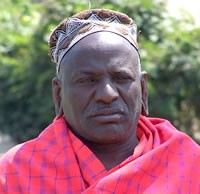The Baraguyu, also known as the Kwavi or Parakuyo, are a subgroup of the Maasai people. They speak the Kwavi dialect, a variety of the Maa language, which is part of the Eastern Nilotic branch of the Nilo-Saharan language family. The Kwavi dialect is closely related to other Maasai dialects, such as Purko and Arusha.
Historically, the Baraguyu have been semi-nomadic pastoralists, relying on cattle herding as their primary livelihood. They inhabit areas in northeastern and central Tanzania, particularly in regions like Manyara and Arusha. Over time, many Baraguyu have faced pressures from land encroachment, conservation policies, and modernization, leading to changes in their traditional lifestyles.
The Baraguyu maintain a pastoral lifestyle, with cattle serving as a central aspect of their culture and economy. Their diet traditionally consists of milk, meat, and blood from their cattle, supplemented by honey and tree bark.
Traditionally, Baraguyu communities live in manyattas (homesteads) constructed from local materials. These homesteads are organized around a central cattle enclosure and are often surrounded by thorn fences for protection. The roles within the community are typically divided along gender lines, with men overseeing cattle herding and women managing household duties and childcare.
In recent years, the Baraguyu have faced challenges due to land disputes, conservation efforts, and the encroachment of agriculture and urban development. These factors have led to reduced grazing areas and have impacted their traditional way of life.
The Baraguyu share the Maasai belief system centered around Enkai (also known as Engai), a monotheistic deity who is both the creator and sustainer of life. Enkai is perceived in two aspects: Enkai Narok (the Black God), associated with blessings, rain, and fertility, and Enkai Nanyokie (the Red God), linked to wrath, drought, and misfortune.
In addition to their reverence for Enkai, the Baraguyu practice animism, believing in the spiritual presence of ancestors and natural elements. Rituals and ceremonies are integral to their spiritual life, often involving offerings and prayers for rain, fertility, and protection.
While many Baraguyu have converted to Christianity, traditional beliefs and practices continue to play a significant role in their daily lives. This syncretism reflects the ongoing integration of new religious ideas with indigenous spiritual traditions.
There is a pressing need for deeper Christian discipleship that respects and thoughtfully addresses traditional beliefs, helping individuals navigate the integration of Christianity with indigenous practices. Although the Bible is available in the Maasai language, more localized translations and audio resources in the Kwavi dialect are needed to enhance understanding and engagement. Ministry efforts aimed at the Baraguyu must be culturally sensitive, recognizing the significance of their traditional beliefs and practices while presenting the gospel in a manner that resonates with their worldview. Beyond spiritual support, the Baraguyu also require assistance in areas such as education, healthcare, and economic development to improve their quality of life and reduce reliance on traditional practices that may hinder progress.
May the Baraguyu people be blessed with a transformative understanding of the gospel that honors their rich cultural identity and meets their spiritual needs.
Pray that the Baraguyu Maasai believers would faithfully preach the gospel and make disciples near and far.
May Christian materials in the Kwavi dialect—Scripture, audio recordings, and teaching resources—be thoughtfully developed and shared; may compassionate local Christian leaders arise to lovingly bridge traditional Maasai beliefs with Christ's teachings, guiding their communities in faith.
May Baraguyu women and youth be empowered to shine brightly, taking active, cherished roles in both their communities and the church.
Scripture Prayers for the Maasai, Baraguyu in Tanzania.
Maasai Language Overview — https://en.wikipedia.org/wiki/Maasai_language
Kwavi Dialect Information — https://en.wikipedia.org/wiki/Kwavi_dialect
Maasai Religion and Beliefs — https://archive.africa/tribe/maasai/
Maasai People - Masai Mara N
| Profile Source: Joshua Project |










